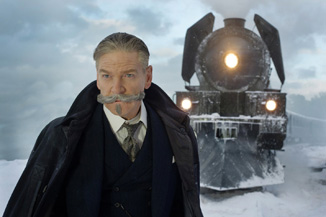|
|
The 400-Word Review: Murder on the Orient ExpressBy Sean CollierNovember 9, 2017
Branagh’s direction is quite effective at dramatic shots on and around the titular train. The movie is a visual feast; lovers of period finery could watch the movie on mute and still be consistently dazzled. Haris Zambarloukos’ cinematography is also worthy of praise; with the exception of a few shots that expose the visual effects, it is a great movie to look at. Branagh is less capable of maintaining the thread of the plot, though; those not intimately familiar with the story will have some difficulty remembering who is who. The whole of the second act consists of interviews with, and revelations about, each suspect; if you’re not taking notes, you’ll need to resign yourself to drifting along and waiting for the inevitable recap at the end. It’s uneven, truncated and tonally odd. But why complain? It’s also gorgeous, fun and evocative. Lovers of early-century mystery and intrigue will sink into Murder on the Orient Express with ease and eagerness; general audiences, meanwhile, will be more than entertained. My Rating: 7/10 Sean Collier is the Associate Editor of Pittsburgh Magazine and a member of the Broadcast Film Critics Association. Read more from Sean at pittsburghmagazine.com/afterdark
[ Read more 400 word movie reviews ]
[ View other movie reviews ]
[ View other columns by Sean Collier ] [ Email this column ]
|

|
|
|

|
Thursday, October 31, 2024
© 2024 Box Office Prophets, a division of One Of Us, Inc.


